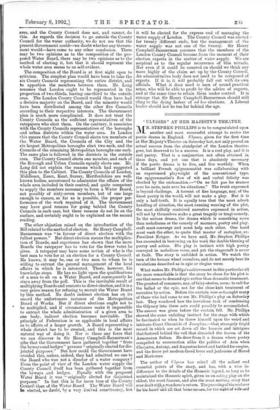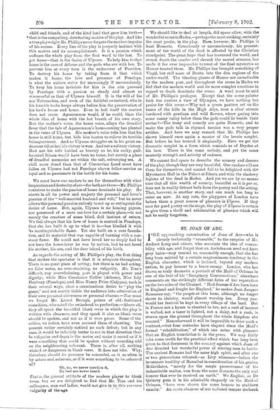" ULYSSES " AT HER MAJESTY'S THEATRE.
AIR. STEPHEN PHILLLPS is to be congratulated upon another and most successful attempt to revive the poetics drama in England. Ulysses, given for the first time at Her Majesty's Theatre on Saturday last, not only proved an actual success from the standpoint of the London theatre- goer, but deserved to be a success. It is a real play, and it is real poetry. That is a conjunction not often attained in these days, and yet one that is absolutely necessary if the poetic drama is to live, and live worthily. When a brilliant French epigrammatist was collaborating with an experienced playwright of the conventional type, the epigrammatist's flow of wit and verbal felicity was checked by the exclamation :—" On ne fait pas les drames avec les mots, mais avec les situations." The truth expressed is beyond challenge. A torrent of fine language, nay, of the finest poetry in the world, will not make a play. But it is only a half-truth. It is equally true that the most adroit handling of situation, the most cunning weaving of the plot, the most skilfully contrived narrative expressed in action, will not by themselves make a great tragedy or tragi-comedy. In the serious drama, the drama which is something more than melodrama or the comedy of manners, poetry and play. craft must converge and must help each other. One hand must wash the other, to quote that master of metaphor, ex- President Kruger. As we have said, Mr. Stephen Phillips has succeeded in bestowing on his work the double blessing of poetry and action. His play is instinct with high poetry conveyed in melodious verse, and yet the stagecraft is never at fault. The story is unfolded in action. We watch the turn of the human wheel ourselves, and do not merely hear its revolutions described as in epic or elegiac verse.
What makes Mr. Phillips's achievement in this particular all the more remarkable is that the story he chose for his plot is one that seems to demand epic rather than dramatic treatment. The greatest of romances, nay, of fairy-stories, seems to call for the ballad or the epic, not for the close-knit treatment of narrative by action. Before the curtain rose Bo tLought many of those who had come to see Mr. Phillips's play on Saturday last. They wondered how the herculean task of condensing the Odyssey into three acts could possibly be accomplished. The answer was given before the curtain fell. Mr. Phillips showed the same unfailing instinct for the stage with which he fascinated us when he threw himself upon the weird and intricate Court Chronicle of Josephus,—that strangely frigid record in which are set down all the horrors and intrigues that festered behind the veil that shrouded the harem of the Asmonaean Sultan. He drew from it a drama where poetry compelled to resurrection alike the politics of Asia when Cleopatra, Antony, and Augustus loved and battled for empire, and the tierce yet modern-faced loves and jealousies of Herod and Maria nine.
The author of laysAes has seized all the salient and essential points of the story, and has, with a wise in- difference to the details of the Homeric legend, so long as he maintained the Homeric spirit, given us an acting play on the oldest, the most famous, and also the most moving. story that ever dealt wilkh a wanderer's return. The yearning of the seafarer for his home ala all that home means, for the sight of wife and
child and friends, and of the kind land that gave him birth-- 1 that is the compelling, dominating motive of the play. And like a trueplaywright Mr. Phillips never forgets the mother-impulse of his scenes. Every line of the play is properly instinct with this motive and its accomplishment. It is a passion which suffuses the whole play from the first word to the last. To get home—that is the desire of Ulysies. To help him to that home is the care of Athene and the gods who are with her. To prevent him at every turn is the endeavour of Poseidon. To destroy his home by taking from it that which makes it home, the love and presence of Penelope, is what the suitors strive for unceasingly if unconsciously. To keep his home inviolate for him is the aim . pursued by Penelope with a passion as steady and almost as resourceful as that of Ulysses himself. It is the will of his son Telemachus, and even of the faithful swineherd, who in his humble tasks keeps always before him the preservation of his lord's house and home. Even in hell itself the contest does not cease. Agamemnon would, if he could, blast the whole idea of home with the hot breath ef his own story. But the mother's voice, the home voice, allays the dreadful fever that the tale of Agamemnon's home-coming has planted in the veins of Ulysses. His mother's voice tells him that his home is still home, but bids him hasten to relieve its terrible beleaguerment. And so Ulysses struggles on be his great en- deavour till at last his victory is won. And not a solitary victory. Had not his wife battled as bravely as he, his rocky, gull. haunted Ithaca would have been no home, but merely a place of dreadful memories set within the salt, estranging sea. A chill more dread than that of Cimmerian Land must have fallen on Ulysses had not Penelope shown fellow-service so loyal and so passionate in the battle for his home.
We must leave our readers to see for themselves with what inspiration and dexterity of art—for both are there—Mr. Phillips contrives to make the passion of home dominate his play. He shows in all its power and majesty the Personal and lover's passion of the "well-married husband and wife," but he never allows this personal passion entirely to eat up or extinguish the desire of home. But, again, Ulysses is no homing pigeon, nor possessed of a mere cat-love for a certain place,—is not merely the creature of some blind, dull instinct of return. We feel always that his love of home is centred in Penelope, that she has built it up to what it is,—has kindled it with its inextinguishable flame. Yet she built on a sure founda- tion, and lit material that was capable of burning with a con- stant flame. He could not have loved her so deeply had he not been the home-lover he was by nature, had he not loved his mother, his son, and the dear island of his birth.
As regards the acting of Mr. Phillips's play, the first thing that strikes the spectator is that it is adequate throughout. There is no great piece of acting; but there is no bad acting, no false notes, no over-straining, no vulgarity. Mr. Tree's difficult, nay overwhelming, part is played with power and .dignity; while Miss Constance Collier (Athene), Miss Lily .Hanbury (Penelope), and Miss Nancy Price (Calypso), each in their several ways, show a conscientious desire to "play the game," and not merely tickle the audience into admiration of .their 0.1111 personal cleverness or personal charms.—Nor must we forget Mr. Lionel Brough, prince of old - fashioned comedians, who acted the swineherd to perfection.—Above all, . they all speak the beautiful blank verse in which the play is written with clearness, and they speak it also as blank verse should be spoken, and not as if it were prose. Some of the critics, we notice, have even accused them of chanting. The present writer certainly noticed no such defect; but in any ease, it would be infinitely better to err in that direction than to vulgarise and degra le the metre and make it sound as if it were something that could be spoken without sounding odd on the neighbouring cab-rank. There is. after all, nothing wicked or dangerous in blank verse. It does not bite. Why, therefore, should its presence be concealed, as it so often is by actors and actresses, an if it were something to be ashamed of? Oh, no, we never mention it, Its feet are never heard.
that is the general attitude of the modern player to blank verse. but we are delighted to find that Mr. Tree and his colleagues, men and ladies, would not give in to' thisperverse
Vulgarity of the ago. .
We should like to deal at length, did space allow, with the wonderful scene in Hades, —perhaps the most striking, certainly the most poetic, in the play. Here, however, Mr. Phillips is least Homeric. Consciously or unconsciously, his present- ment of the world of the dead is affected by the Christian standpoint. The great hope that has traversed the world, and struck dumb the oracles and shrunk the sacred streams, has made it for ever impossible to treat of the final mysteries as Homer treated them. Mr. Phillips has brought something of Virgil, but still more of Dante. into the dim regions of the under-world. The bleating ghosts of Homer are unrealisable by the modern poet, and throughout the scene in Hades we feel that the modern world and its more complex emotions in regard to death dominate the scene. A word must be said of Mr. Phillips's prologue. Except that the scene-painter took too austere a view of Olympus, we have nothing but praise for this scene.—Why not a green pasture set on the knees of the hills in the High Alps, near a clear stream bordered with gentians and wild flowers, where gazing into some sunny valley below them the gods could lie beside their nectar P—The irony and comedy are quite Homeric, and to make the gods talk in rhymed heroics was a very proper artifice. And here we may remark that Mr. Phillips has shown himself once again a master of the heroic couplet. But before he has treated it elegiacally. Here we get the dramatic. couplet in a form which reminds us of Dryden at his best. There is the same melody, and yet the same masterly strength and activity of cadence.
We cannot find space to describe the scenery and dresses of the play, though they are very beautiful. Our readers will see them for themselves, and cannot fail to be delighted with the Mycenaean Hall in the Palace at Ithaca, and with the shadowy legions of the dead in Hades. And yet we are by no means sure that all this wealth of scenery, beautiful as it is per se, does not in reality detract both from the poetry and the acting. That, however, is another story, and one much too long to enter on now. At any, rate, the playgoers of London have before them a great source of pleasure in Ulysses. If they care for good poetry on the stage, the play of Ulysses is certain to give them a thrill and eebeleration of pleasure wheels will not be easily forgotten.











































 Previous page
Previous page